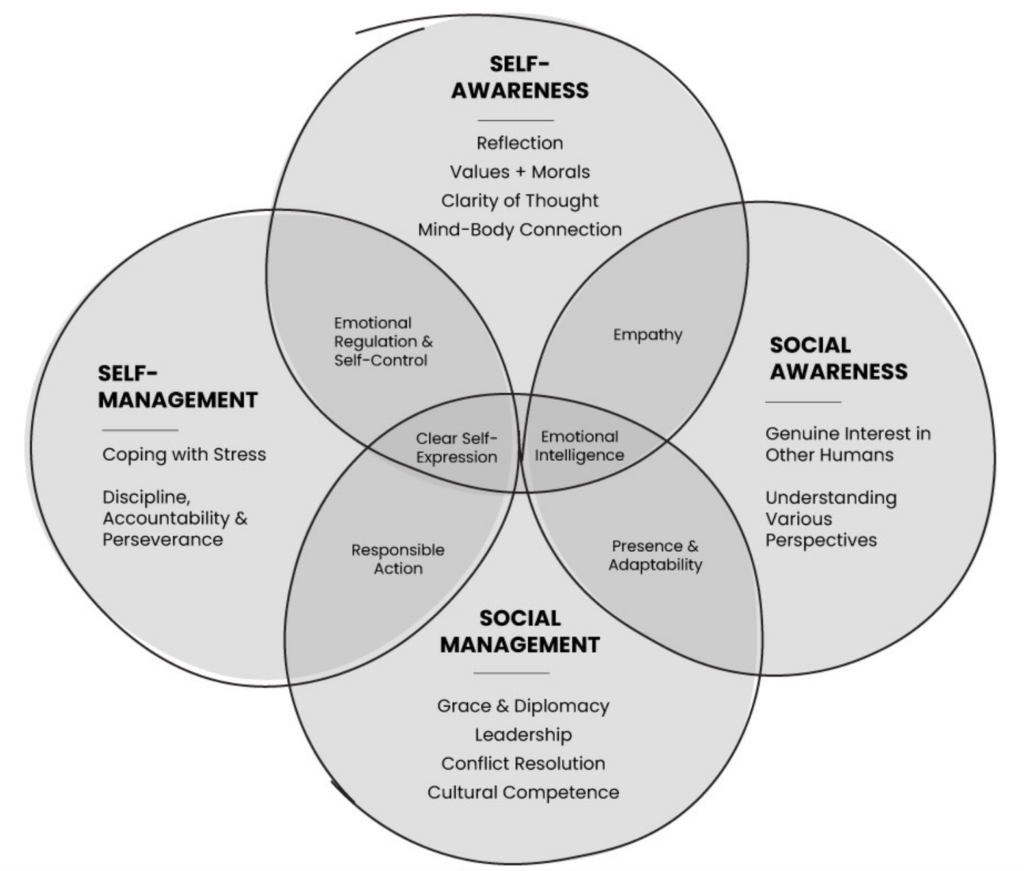You know yourself, and that’s crucial. But self-awareness doesn’t build strong relationships. You can’t self-aware your way out of life’s inherent complexity and awkwardness.
Your awareness must be paired with management. This includes the ability to regulate how your thoughts, emotions, and behaviors contribute to your own suffering and impact other humans. No matter how well you know yourself, lacking social management skills can lead to strained relationships and isolation.
In this blog, we look at human intelligence and wellness across four pillars:
-
- Self-Awareness (Know Yourself)
-
- Social Awareness (Know Others)
-
- Self Management (Lead Yourself)
-
- Relationship Management (Manage Relationships)

Know Yourself More: Understand Your Strengths and Areas for Growth
Leading balanced lives requires skills derived from each quadrant. Use this as a roadmap for assessing your current strengths and charting a path for growth in other areas.
✅ Having Self-Awareness without ⛔ Social Management
If you know yourself well but lack social management skills, you could unintentionally come across as blunt or insensitive. Lacking social management skills means you apply less consideration to the impact of your behaviors and energy. Adapting your communication approach for different people or situations seems disingenuous to you. But adhering to just one way of expressing yourself leads to avoidable misunderstandings and unnecessary conflict. Despite how well you may know yourself, the challenge lies in differentiating your personal opinions and experiences from the rest of reality.
Consider the vast and diverse experiences of others. While you have good self-awareness, your shortcomings in self and social management could result in strained relationships, missed opportunities for an expanded worldview, and difficulty getting buy-in on your thoughts and ideas.
Tips for Becoming More Socially Attuned
Leverage how well you know yourself to be more intentional in how you engage with others. Practice active listening, giving full attention to another human. Ask more questions. Not to fill space, but to show real interest in someone else’s life.
I used to struggle with this. If I didn’t share a common interest with someone, asking questions about it felt forced or fake. But here’s what shifted: I realized that someone doesn’t need to be like me to be fascinating. That sounds obvious, but once I internalized it, my natural curiosity grew–and conversations got better. Now, the fact that someone’s experiences, interests, and worldview are different from mine is what makes them interesting.
Lastly, practice being attuned to non-verbal cues, such as body language and facial expressions. Don’t use these signals for attempts to figure out how the other person is feeling. Use it as insight for managing yourself through the conversation. Does the other person seem disengaged or distracted? Pause and check in with them. Do they seem like they’re holding back their thoughts? Ask them to share how your words are landing. When did they last contribute to the conversation? Invite their perspective on one part of your thoughts before jumping to the next.
Reading into non-verbal cues isn’t attempts to mind-read. Managing yourself in real time based on cues makes conversations more thoughtful, reciprocal, and human.
Practical Wisdom Begins With How Well You Know Yourself
Insufferable phrases like “That’s just the way I am” and “If you don’t like it, that’s your problem” don’t signal confidence. These are declarations of immaturity. Real confidence is flexible. Making adjustments in delivery while remaining true to your principles leads to more constructive and meaningful interactions. When we recite slogans to defend our behavior, we bypass the real work of discernment. Aristotle called this practical wisdom: knowing how to act in this moment, with this person, in this context. That’s how finding your people —and growing as an individual—actually happens.






